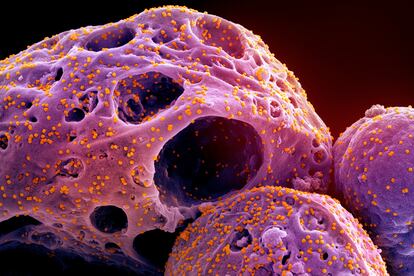Latest Covid variant is not really named Kraken and does not seem worse than other strains
The WHO is monitoring the newest iteration of the coronavirus, which is showing tremendous transmission power in the US but has not caused more virulent effects

Ever since the Covid pandemic began and new variants of the original virus emerged, each new one became “the most contagious.” Alpha was much more transmissible than the original, but less so than Beta, which in turn had less transmission power than Delta, which was very contagious but not as much as Omicron. In this evolution, the last step (for now) is XBB.1.5, a subvariant of Omicron that has been unofficially nicknamed Kraken. This sub-variant is quickly making inroads in the the United States, although it does not seem to cause more serious effects than its predecessors.
XBB, a fusion of two Omicron variants, has been under surveillance by the World Health Organization (WHO) since early December. Two mutations have given rise to XBB.1.5, which has become the leading candidate to prevail worldwide after growing rapidly in the United States, where XBB and its descendant account for almost half of all cases. The WHO has already detected it in 25 countries.
The very nature of the virus means that for a variant to become predominant, it has to be more contagious than the previous ones. However, the transmission capacity of a virus is not an absolute and isolated fact, but the result of its interaction with its hosts and their immune status.
Since vaccines became widespread, none of the SARS-CoV-2 variants has proven to be more serious than the previous one. There has not been any that has produced a greater proportion of deaths or hospitalizations in a population with stronger defenses generated both by injections and naturally via infections. And for the moment, XBB.1.5 does not seem to be an exception.
When a variant causes a huge number of infections, however, it also statistically increases the number of people who can become seriously ill or die, even if overall it is much less deadly than previous forms of the virus.
This confirms that the variants are getting milder: even with millions of infections, they are not capable of straining intensive care units the way the first waves did, although they can still cause the death of hundreds of people, especially the very old and vulnerable already suffering from pre-existing conditions.
For technical reasons, Omicron has been the last variant to officially be named with a letter from the Greek alphabet - Alpha, Beta, Delta, Omicron. All the rest have been subvariants known only with a string of letters and numbers and which have sometimes received improvised nicknames to make identification easier, such as “Centaurus” or “Hellhound.”
“Kraken,” which alludes to a sea monster from Scandinavian folklore, was the brainchild of Ryan Gregory, a biology professor at the University of Guelph (Ontario, Canada), who tries to make information about new technologies more accessible. Yet these new subvariants are typically neither as hellish nor as monstrous as their names suggests. Of the hundreds of variants that have circulated and the dozens that have been identified as dangerous, only a few have managed to prevail, and in an increasingly less virulent way.
Still, the WHO warns that when more infections take place, the more likely it is that the virus will mutate and avoid the immune system. It is an inherent risk of any virus: that at some point it will become more deadly, as is currently the case with the flu, which has repeatedly caused serious epidemics throughout history.
Sign up for our weekly newsletter to get more English-language news coverage from EL PAÍS USA Edition
Tu suscripción se está usando en otro dispositivo
¿Quieres añadir otro usuario a tu suscripción?
Si continúas leyendo en este dispositivo, no se podrá leer en el otro.
FlechaTu suscripción se está usando en otro dispositivo y solo puedes acceder a EL PAÍS desde un dispositivo a la vez.
Si quieres compartir tu cuenta, cambia tu suscripción a la modalidad Premium, así podrás añadir otro usuario. Cada uno accederá con su propia cuenta de email, lo que os permitirá personalizar vuestra experiencia en EL PAÍS.
¿Tienes una suscripción de empresa? Accede aquí para contratar más cuentas.
En el caso de no saber quién está usando tu cuenta, te recomendamos cambiar tu contraseña aquí.
Si decides continuar compartiendo tu cuenta, este mensaje se mostrará en tu dispositivo y en el de la otra persona que está usando tu cuenta de forma indefinida, afectando a tu experiencia de lectura. Puedes consultar aquí los términos y condiciones de la suscripción digital.









































